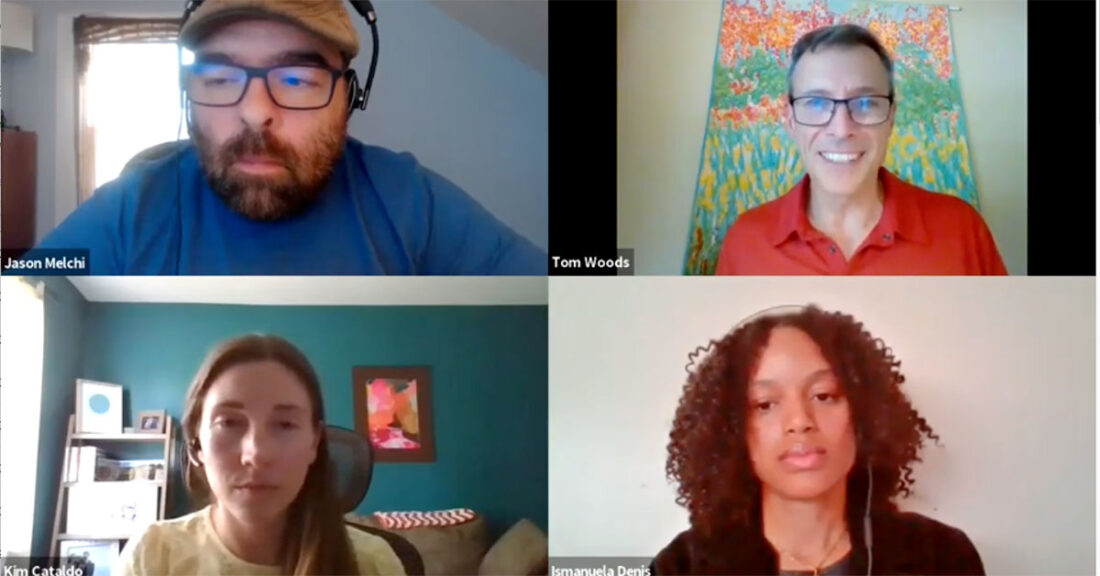Juvenile Justice Resources: Webinars on Effective COVID-19 Responses

Eight new webinar recordings describe effective juvenile justice practices amid the coronavirus pandemic. The one-hour webinars feature practical advice by and for youth justice system leaders and practitioners responsible for keeping young people, communities and agency staff safe. The webinars highlighted below are organized by four juvenile justice priorities that should guide the field during and after the pandemic.
“Promoting young people’s long-term success and doing so equally for youth of every race and ethnicity, everywhere and every day, is at the heart of the path forward for youth justice systems,” says Nate Balis, director of the Foundation’s Juvenile Justice Strategy Group.
The webinars premiered on JDAIconnect, the Annie E. Casey Foundation’s online community for JDAI® practitioners and people interested in youth justice. Join JDAIconnect to discuss what you’re watching or view other free webinars related to building a better and more equitable youth justice system. The webinars are coordinated by JDAI’s training partner the Pretrial Justice Institute.
Priority 1: Stop new admissions to juvenile detention, correctional and placement facilities
Courageous Leadership in the Time of COVID-19: Reducing Detention Admissions
No young person should spend a single day in detention unless there is an immediate and substantial risk to public safety. This is particularly true given the potential for a full-blown health crisis in any facility where people are living in close quarters. In this webinar, leaders of juvenile justice agencies — two at the state level and one at the county level — discuss how they have reduced admissions dramatically and equitably since the onset of the pandemic. The leaders describe how they are using community-based alternatives to detention and the implications for future practice of safely and significantly reducing the use of detention. Recorded on May 15, 2020.
Data-Driven Responses to COVID-19
The patterns emerging from jurisdictions in response to COVID-19 reveal how rapidly and dramatically change is happening in juvenile justice agencies across the country. The data offer insight to state and local leaders about how their own jurisdictions compare to larger trends. By asking themselves the right questions, leaders can begin to understand what’s behind the numbers, what’s working and what’s not. This webinar offers questions that leaders can ask themselves to scrutinize detention decisions and to review and reconsider policies that result in confinement. Recorded on July 7, 2020.
Priority 2: Release young people from secure and group care settings as quickly and safely as possible
Breaking Down Barriers to Release During the COVID Crisis and Beyond
After a surge of releases from detention in March 2020, the pace of releases slowed, leaving many young people — disproportionately Black — still living in confinement without access to opportunities or connections, and potentially vulnerable to the virus. This webinar promotes actions that accelerate releases, such as reviewing individual cases and planning for the safe release of each youth from detention. The discussion refers to overcoming barriers and complications to releases that have arisen due to the pandemic. Recorded on April 29, 2020.
Priority 3: Provide meaningful and developmentally appropriate support and services to the small number of young people remaining in out-of-home confinement
Collaboration During COVID-19: Supporting Youth and Staff
Even as the youth justice field is dramatically reducing the number of youth in detention and other forms of out-of-home placement, some youth remain in custody with frontline staff responsible for their care. The panelists in this webinar offer examples of successful approaches to keeping young people and staff safe in facilities using technology, collaboration and compassion. Then the panelists discuss their strategies for maintaining the most effective of these innovations beyond the pandemic. Recorded on June 13, 2020.
Priority 4: Suspend requirements that are at odds with public health recommendations for youth who are on probation or some form of community supervision
Young Adult Voices on the Effect of COVID-19 on Youth Involved in the Juvenile Justice System
Four youth advisors working with the Foundation’s Juvenile Justice Strategy Group discuss how youth involved in the juvenile justice system have been faring since the onset of the pandemic. Based on their connections with youth currently in juvenile justice facilities and on probation, the advisors convey how youth are coping, meeting their needs — or not — and feeling about how their local justice system is responding to COVID-19. They reveal possible blind spots in local responses identified by young people. Recorded on August 19, 2020.
The Changing World of Youth Probation During COVID-19
This webinar focuses on the families of young people on probation. With many or most young people on probation sheltered in place, parents, caregivers and other family members in physical contact with a young person are key partners for youth on probation to succeed. Experts in building positive partnerships between probation officers and family members describe why and how to support families as part of achieving the long-term well-being of young people on probation. Recorded on June 18, 2020.
Creative Approaches in Challenging Times: The Vital Role of Community-Based Organizations in Supporting Youth and Families
Community-based organizations in the youth justice field enable youth to be heard, respected and supported in their own neighborhoods. Leaders of three community-based organizations share effective strategies on meeting the immediate needs of youth and families during the pandemic, being nimble in times of crisis and partnering with juvenile justice systems to reduce admissions to juvenile facilities and increase releases. The panelists note that sustaining local organizations requires public funding and respect for and recognition of the role they play in keeping young people safely in their communities and with their families. Recorded on July 15, 2020.






